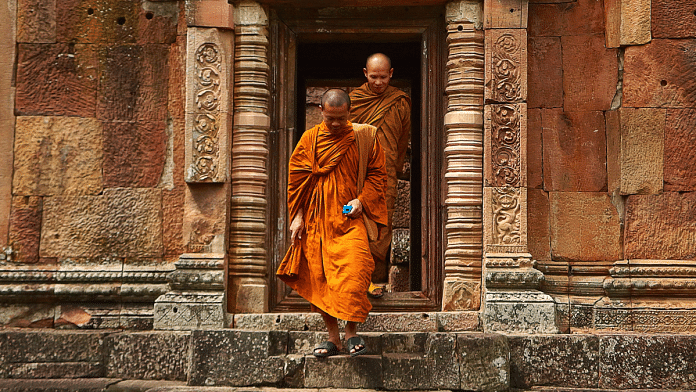New Delhi: Buddhism is an important part of national identity in Thailand, Sri Lanka and Cambodia, while the same applies for the Muslims in Malaysia and Indonesia, according to a survey by Pew Research Center.
The survey of 13,122 adults from six countries — Thailand, Sri Lanka, Cambodia, Malaysia, Indonesia and Singapore — was conducted between June and September 2022 in eight languages.
The survey assessed the intersection between religion and national identity in these six countries. Thailand, Sri Lanka and Cambodia are three of the world’s seven Buddhist majority nations, while Malaysia and Indonesia are Muslim majority nations. Singapore is a religiously diverse nation, according to Pew.
In Cambodia, Sri Lanka and Thailand, where at least 70 per cent of the population are Buddhists, upwards of nine-in-ten Buddhists say being Buddhist is important to truly being part of their country according to the survey.
As many as 97 percent of Buddhists in Cambodia said being Buddhist is important to being truly Cambodian, while 95 percent in Sri Lanka and 91 percent in Thailand have the same view.
Similarly, nearly all Muslims in Malaysia and Indonesia say being Muslim is important to truly be a Malaysian or an Indonesian, the report — published 12 September — states.
Three-quarters of Malaysians (75 percent) and Indonesians (77 percent) assert that Islam is an ‘ethnicity’ that one is born into. Almost three-quarters of Muslims in both countries describe Islam as a ‘culture’ or a ‘family tradition’ that one must follow.
This sentiment is not just common amongst the Buddhist or Muslim countries in South and Southeast Asia. According to a 2021 Pew Research Center survey, 64 percent of Hindus in India say that being Hindu is very important to the Indian identity.
Religious diversity and national identity
In Malaysia (62 percent), Singapore (62 percent) and Sri Lanka (56 percent) of the respondents say that having people from different backgrounds make their country a better place to live. Only 6 percent or fewer respondents say that it makes their countries a worse place to live in.
In an example of religious tolerance, a majority of Buddhists, Hindus, Muslims, Christians, followers of Chinese traditional religions and indigenous beliefs in each of these countries reports a willingness to accept neighbours from a different religion.
While there exists a broad acceptance for religious coexistence, there exists a strong cultural superiority within the six surveyed countries. Clear majorities in these countries say that their ‘culture is superior to others.’
As an example, Malaysians were asked, “Malaysian people are not perfect but Malaysian culture is superior to others.” The same was repeated to adults throughout the five other countries surveyed.
93 percent of Cambodians, 92 percent of Sri Lankans, 91 percent of Malaysians, 89 percent of Indonesians, 76 percent of Thai and 61 percent of Singaporeans agreed with the aforementioned question — highlighting a clear belief in the superiority of their cultures.
Amongst the people surveyed, those who believe that religion is very important in their lives are more likely to completely agree that their cultures are superior to others. For example, the survey reports that 70 percent of Sri Lankans for whom religion is very important agree on their cultural superiority. In comparison, only 41 percent of Sri Lankans for whom religion is less important agree with this statement.
This sentiment is also similar in India, with 90 percent of respondents in the 2021 Pew survey believe that Indian culture is superior to others.
Also Read: Global public opinion of India is positive, finds new Pew survey of 23 countries
Influence of religion on national laws
A majority of Buddhists in the Buddhist nations surveyed and a majority of Muslims in the Muslim nations believe that their laws should be based on religious teachings.
Nearly all Cambodian Buddhists surveyed (96 percent) are of the opinion that Cambodian law should be based on Buddhist dharma — a wide-ranging concept that includes the knowledge, doctrines and practices stemming from Buddha’s teachings as reported by Pew.
86 percent of Sri Lankan Buddhists feel the same way. More than half (56 percent) of Thai Buddhists believe in basing national laws on Buddhist dharma.
But, Buddhists are less supportive of Buddhist-dharma based laws in Indonesia, Malaysia and Singapore, where they are not in a majority.
43 percent of Malaysian Buddhists and 39 percent of Singaporean Buddhists believe in national laws based on Buddhist teachings. 31 percent Singaporeans and 19 percent Malaysians are Buddhists as reported by Pew.
In Muslim-majority Malaysia and Indonesia, a majority of Muslims supported the imposition of Sharia law. 86 percent in Malaysia and 64 percent in Indonesia support the establishment of Sharia.
(Edited by Tony Rai)
Also Read: From a ‘4th-rate power’ to ‘critical partner’: How US-Vietnam relations have evolved since war



